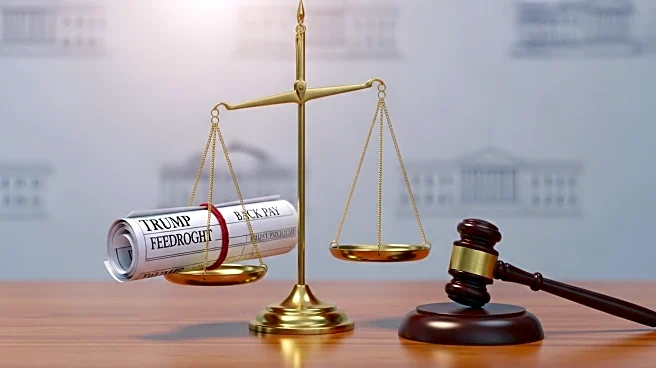What's Happening?
The Trump administration has faced criticism over its handling of back pay for furloughed federal workers during the government shutdown. Initially, the Office of Management and Budget (OMB) released guidance suggesting that the back pay law applied only to the 2019 shutdown. However, notices sent to IRS employees and other federal workers contradicted this, stating that the Government Employee Fair Treatment Act of 2019 guarantees compensation for furloughed employees during any lapse in appropriations. This discrepancy has led to confusion and concern among federal workers, particularly as the IRS began furloughing around 35,000 employees due to depleted funds.
Why It's Important?
The issue of back pay for furloughed federal workers is critical, as it affects the financial stability of thousands of employees during government shutdowns. The Trump administration's interpretation of the back pay law has been challenged by both Democrats and Republicans, who argue that the law guarantees retroactive pay for all future shutdowns. Legal experts have also criticized the administration's stance, emphasizing the legislative intent to protect federal workers from financial hardship during shutdowns. The controversy highlights the broader implications of government shutdowns on public sector employees and the importance of clear and consistent policy guidance.
What's Next?
The Trump administration may face further scrutiny and legal challenges over its interpretation of the back pay law. Congressional leaders are likely to push for clarification and enforcement of the law to ensure that federal workers receive the compensation they are entitled to. The situation may also prompt discussions on legislative reforms to prevent similar issues in future shutdowns. Federal agencies, including the IRS, will need to navigate the complexities of furloughs and back pay policies, potentially impacting employee morale and union relations.
Beyond the Headlines
The controversy over back pay for furloughed federal workers underscores the broader challenges of managing government shutdowns and their impact on public sector employees. It raises questions about the adequacy of existing legal frameworks to protect workers and the role of administrative discretion in interpreting laws. The situation also highlights the need for robust communication and transparency in government operations, particularly during periods of fiscal uncertainty.









